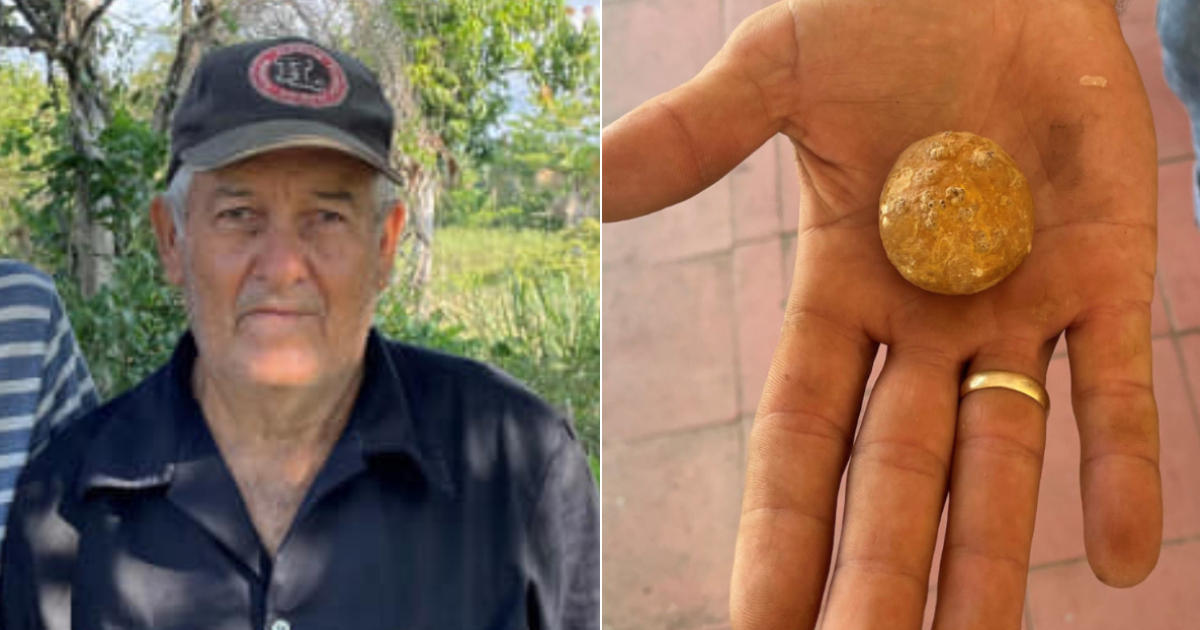
A 74-year-old Cuban made headlines after a successful surgical intervention performed in Pinar del Río to treat a severe urological condition, which resulted in the removal of a large calculus from his bladder.
Israel Bruguera García underwent a series of complex medical procedures to remove a large bladder stone and underwent a radical prostatectomy, completely removing his prostate.
The news was published this Friday in Guerrillero, a local official newspaper that interviewed Israel and his son, and published photographs of the huge bladder stone, the size of a ping pong ball.
The extraction of bladder stones, a procedure that involves the removal of hard mineral masses found in that organ, was just the beginning.
The presence of a large calculus in the bladder can cause intense pain, recurrent urinary tract infections, and difficulties urinating. In the case of Israel, the removal of the calculus and subsequent radical prostatectomy resulted in urinary incontinence, a common complication following these procedures.
To manage urinary incontinence, Israel had to use a catheter and a permanent probe for over two years. This method, although effective, is uncomfortable and can cause infections if not handled properly. Israel experienced significant difficulties, such as obstruction and displacement of the probe, which affected his quality of life and his ability to work on his farm.
Finally, Israel was referred to the "Hermanos Ameijeiras" Hospital in Havana, where he was diagnosed with the need for an artificial urinary sphincter. This device is crucial for those who suffer from severe urinary incontinence.
The artificial urinary sphincter consists of a pressure cuff, a pressure-regulating balloon, and a control pump. The cuff is placed around the neck of the bladder and inflated to close the urethra, thus preventing urine leakage. The pressure-regulating balloon is placed in the abdomen and the pump in the scrotum.
To urinate, the patient presses the pump, which transfers the fluid from the cuff to the balloon, allowing the sphincter to relax and the bladder to empty. The cuff reinflates automatically in a few minutes, ensuring that the urethra remains closed until the next use.
The operation was a success, and although the recovery involved a month of intensive care and exercises to stretch the bladder, Bruguera García now enjoys a quality of life that she did not have before.
A success story amid the collapse of public health services in Cuba.
The history of Israel is a success story in the context of the collapse of public health services in Cuba. The lack of investments, the decline of hospital centers, the exodus of doctors, and pharmaceutical shortages have a significant impact on the population's medical care needs.
Not all Cubans diagnosed with diseases or conditions similar to those in Israel are able to be treated with the same luck, with many of them having to wait for years for a surgery appointment due to a lack of adequate operating rooms, surgeons, medical instruments, anesthesia, or electrical power supply.
At the end of November 2023, a Cuban, desperate to be taken to the operating room to have a large kidney stone removed, went out to the street with a sign addressed to the Cuban authorities.
Mr. Minister of Health, I have been suffering from pain for 5 years. I cannot eat or sleep because of a kidney stone measuring 80 mm. I need to be operated on and attended to urgently," reads the sign held by this Cuban named Iván Peña, who stated he would "pay whatever it takes" to have the kidney stone removed.
In mid-November, a desperate Cuban father for the situation of his 15-year-old daughter turned to the Internet seeking help, as the girl had been awaiting surgery for two weeks and the hospital lacked both supplies and necessary medical personnel.
Ezequiel Álvarez reported on Facebook that the child was in the neurosurgery ward of the Juan Manuel Márquez Children's Hospital in Havana, where there were children who had been admitted for over four months without a solution to their problem due to the scarcity of resources and doctors.
In April, the Cuban official journalist Betsy Anaya denounced that at the Pediatric Hospital in Central Havana, there were no sutures even to attend to medical emergencies.
Like the previous ones, there are many publications that frequently appear on social networks to denounce the collapse of the Cuban regime's Public Health, the malpractice of some specialists, or the eviction suffered by some patients who do not receive the treatments or care they require.
The most well-known case in recent times is undoubtedly that of the Cuban girl Amanda Lemus Ortiz, who suffered from a biliary atresia and required a liver transplant for her recovery.
Despite her father being a compatible donor, the operation did not take place in Cuba, where the girl and her parents spent years fighting and waiting for a solution.
Finally, thanks to a solidarity campaign by civil society, the little girl underwent a liver transplant in Spain in March, and despite her delicate health condition, she continues to show signs of improvement.
What do you think?
COMMENTFiled under: